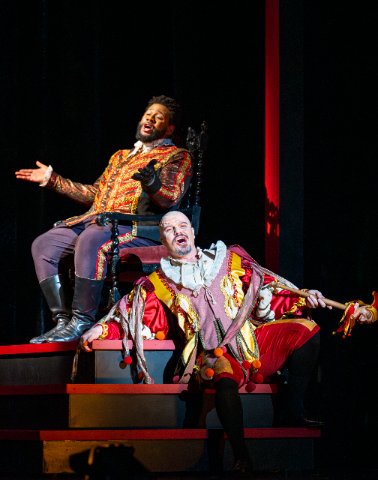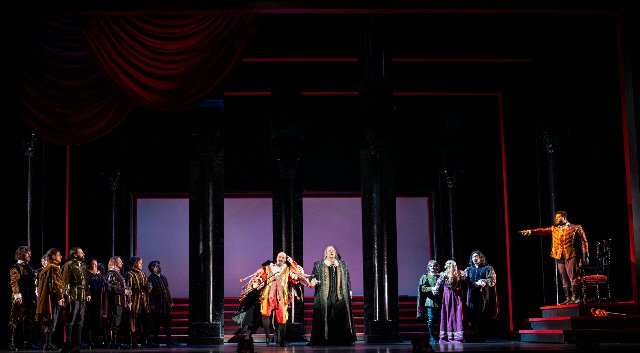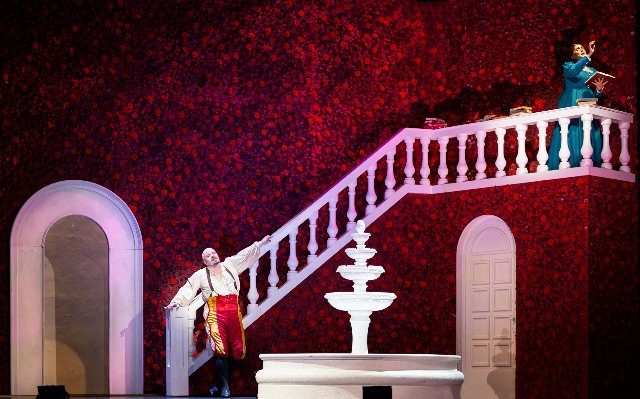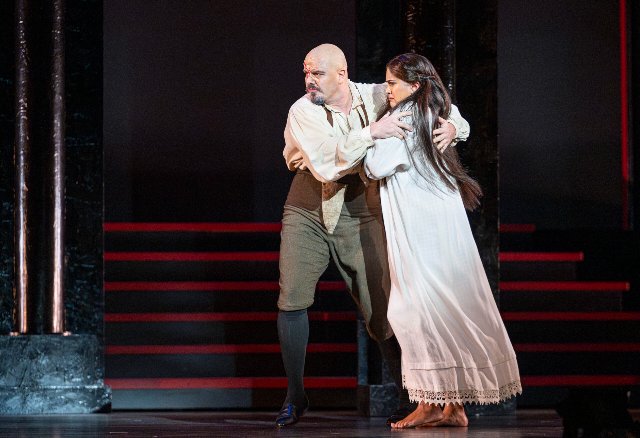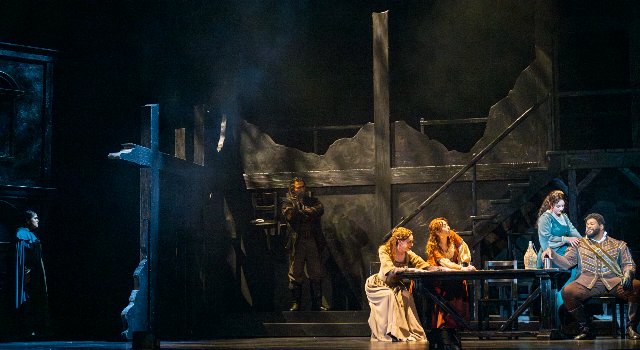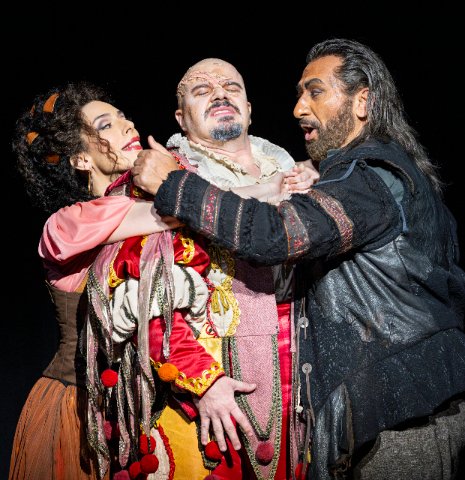Rigoletto
Opera San Jose's Powerful Production of Verdi Masterpiece
By: Victor Cordell - Feb 15, 2024
The sixteenth of Giuseppe Verdi’s operas, “Rigoletto,” which debuted in 1851, marked an inflection point in the composer’s career. The opera represented his first masterpiece of the highest order and the beginning of his rich middle period trove, to be followed immediately by “Il Trovatore” and “La Traviata.” Although the libretto truncates important developments in the narrative, it touches on numerous themes from family relationships, romantic love, and gender norms to honesty and integrity.
“Rigoletto”’s brass-dominated foreboding prelude and this production’s mostly low lighting and darkened sets foretell the tragedy ahead. The drama is intense and dispiriting, but the music is glorious like few other operas. Four of its highly melodious and uplifting arias and quartets are fixtures in opera music compilations. Remembering them may cause one to forget how many other luxuriant phrases and passages grace the score, not to mention the fireworks from the many highly emotional tracks. Act 1 alone contains a complex double ensemble and two beautiful duets.
Opera San Jose offers a highly entertaining, riveting, and traditional rendition, maintaining the complexion that made the opera controversial in its own day for its immorality and even more so in current times for its social incorrectness. The jester Rigoletto hypocritically obsesses over his daughter Gilda’s honor, yet publicly lampoons courtiers as being cuckolded. At the same time, women are treated as chattel. Rigoletto’s employer, the Duke of Mantua, lies and debauches, yet Gilda, will make the ultimate sacrifice to protect the Duke, her abusive and libertine lover, who has shown no reciprocal commitment.
The taunted and isolated Rigoletto, who values only Gilda in this life, is portrayed by Eugene Broncoveanu, veteran of the role and OSJ stalwart. His deceptively effortless and clarion baritone booms throughout this demanding part, which requires diverse acting skills as well as a versatile voice. Those qualities culminate when Rigoletto confronts the courtiers upon learning that Gilda has been kidnapped. Interestingly, the title role is large and presents vocal challenges, yet with the exception of a small participation in the glorious quartet section of "Bella figlia dell'amore" ("Beautiful daughter of love"), it lacks a real signature number.
Rigoletto has cloistered Gilda so that she doesn’t know the ways of the world. Her naivete leads to her deceiving her father and the impulsive willingness to give up her life for love. Soprano Melissa Sondhi is Gilda, and early in Act 1 on opening night, her voice sounded thin and strained. Fortunately, she was fully prepared by the end of the act for the moment that emblemizes the innocent girl. The haltingly beautiful “Caro nome" ("Dearest name") tells of her first love, really an infatuation, for the student Gualtier Malté, who is the Duke in disguise. Sondhi’s voice was warm and evocative, and she milked the brief aria for all it is worth. The silences between single notes were palpable, and her ornamentation was delightful.
Detached from the opera, and without knowing the context of its most famous arias, one might think that the Duke is heroic, rather than the cad he really is. His “La donna è mobile” ("Woman is fickle") is one of the most famous arias in the consciousness of the general public, but the Duke also sings the bouncy "Questa o quella" ("This woman or that") and the solo portion of lavish "Bella figlia dell'amore.” Tenor Edward Graves handles each with great dexterity and in fine voice. His Italianate melodiousness (some might say twang) fits perfectly with this great work from the Italian canon.
The supporting cast is strong. Two basses stand out – Philip Skinner as the mournful and vengeful Monterone who issues a curse on Rigoletto, and Ashraf Sewailam as Sparafucile, the assassin who Rigoletto pays to murder the Duke. Mezzo Melisa Bonetti Luna shines as Maddalena, Sparafucile’s sister, whose morality falls beneath her brother’s. Conductor Jorge Parodi keeps the orchestra and action at a brisk pace making for a highly rewarding experience.
“Rigoletto” composed by Giuseppe Verdi with libretto by Francesco Maria Piave produced by Opera San Jose, plays at California Theatre, 345 South First Street, San Jose, CA through March 3, 2024.

